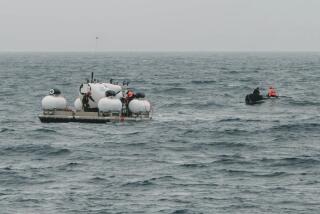For Titan, Deaths Hit Close to Home
- Share via
Craig Drobnick wears a bracelet of black anodized aluminum. The words etched in the metal say: Todd Drobnick, KIA 23 Nov. 03, Mosul, Iraq.
KIA means killed in action, and in a way, Craig’s brother was.
A senior manager in charge of a team of translators working for San Diego defense contractor Titan Corp., Todd Drobnick dodged 15 attacks from small-arms fire, rocket-propelled grenades and homemade bombs during his last seven months.
When he died, in a head-on collision with a petroleum truck near Mosul, he wasn’t a solider. But the 35-year-old fluent in Russian and Arabic, a veteran of the 1991 Persian Gulf War, was buried with full military honors and posthumously awarded a Purple Heart and a Bronze Star. To his family, and to Titan, Drobnick was as much a casualty of war as anyone in uniform.
He recognized the hazards. His e-mails and phone calls “just got more and more urgent,” said Drobnick’s father, John, a veteran of the Vietnam War, “like he could tell what might happen.”
The accident that claimed Drobnick’s life killed another linguist working for Titan. They were the 12th and 13th Titan translators to die in Iraq -- felled by attacks from insurgents, accidents or illness -- since major combat operations officially ended more than a year ago. The 14th, last week, was Emad Mikha, who had managed the meat department in a supermarket in Pontiac, Mich., before he signed up with Titan to take advantage of his proficiency in Arabic.
Civilians have worked alongside the military in dangerous environments since wars began. Yet for years, Titan had somehow escaped death. Though it had supplied the Pentagon with linguists since 1999, dispatching them to danger zones from Somalia to Chechnya, there hadn’t been a single fatality among the company’s battalion of translators.
Iraq has changed everything.
The fatalities among contractors there -- and, more recently, the seizing of civilian hostages and the slaying last week of an Italian security guard -- “raise certain issues that we have not had to face so directly” before, said Ian Lesser, vice president and director of studies for the Los Angeles-based Pacific Council on Foreign Relations. “We have been comfortable with the idea of civilians handling many of these types of jobs. But we are confronting in a very stark way the human costs of this kind of outsourcing.”
For many in the U.S., that was brought home last month when four Americans who worked for Blackwater Security Consulting were killed in Fallouja, their charred bodies dragged through the city before at least two were hung from a bridge over the Euphrates River. Ten days ago, a fuel convoy being run by Halliburton Inc.’s KBR unit was ambushed near Abu Ghraib on a main highway west of Baghdad and seven employees, from the subsidiary formerly known as Kellogg Brown & Root, disappeared.
In San Diego, Titan executives declined to comment on their linguists program. One explained privately that the company had no desire to appear as though it was seeking publicity from the tragedies. Indeed, this is a sensitive time for Titan. Lockheed Martin Corp. has offered to buy the company for $1.66 billion, but allegations that Titan made illegal payments to foreign officials have threatened to nix the deal.
The Titan website doesn’t put a sheen on its translating jobs, which pay up to $108,000 a year, most of that tax-free: “12-hour shifts and in excess of 60-hour weeks in order to provide continuous contract linguist support that this 24 x 7 operation requires; must be familiar with the local culture, conduct oneself in accordance with local customs, and deal unobtrusively with the populace; must be willing and capable to live and work in a harsh environment.”
Still, the applications keep coming in, from Iraqis looking for decent wages, from Iraqi-Americans who feel a duty to help rebuild their country and from military veterans such as Drobnick who seemed to thrive on taking risks.
After he graduated from Mariner High School in Everett, Wash., in 1986, he enlisted in the Army. His mother, Sharon, recalled that he blossomed there. At the Defense Language Institute, he learned Arabic, then Russian. And in the summer of 1990, he was deployed to Saudi Arabia with Alpha Company of the 311th Military Intelligence Battalion, known as the “Eyes of the Eagle.”
Going to war was a tradition: At least one person on his mother’s or his father’s side of the family had served in every conflict since the Civil War. Every one had come home alive.
After a post-Gulf War tour in Kuwait, Drobnick left the Army. He spent the next nine years trying to recapture the feeling he had in the Gulf. He climbed mountains, ran marathons, trained to be a pilot. He competed in ultra-endurance races, two Eco-Challenges that covered 300 miles of terrain and one 50-kilometer trail run that included a 5,000-foot climb in elevation.
None of it made him happy. In September 2002, he wrote a letter to his closest friends and family: He had decided to return to the Gulf, the last place, he said, where he had felt truly alive. He had landed a job with a company guarding U.S. military equipment at an undisclosed location.
“I will be serving side by side with the military giving me a chance to see if this is where I left it,” he wrote. “I don’t know if it was the time, the place, the people, the job, or me, but I really enjoyed life.”
On that assignment, he befriended a former member of the 82nd Airborne Division, Jason Ayres, an Indiana native who had been trained for deep reconnaissance missions. In March 2003, as the U.S. invasion of Iraq was underway, they both went to work for Titan, lured there in part by a recruitment bonus.
From its headquarters in San Diego, the defense contractor had for decades focused on supplying the hardware for what the military refers to as C4ISR, shorthand for command, control, communications, computers, intelligence, surveillance and reconnaissance. The work of its then relatively small translating division, in the words of its 2002 annual report, “took on new meaning and emphasis” on Sept. 11, 2001. Two Titan employees at the Pentagon died, though nine at the World Trade Center escaped without injury.
Titan decided to place a greater emphasis on a major shortcoming of the U.S. war on terrorism: the lack of expertise in languages such as Pashto, Dari, Urdu, Arabic, Farsi, Uzbek and rare Middle Eastern dialects. The company targeted job fairs and language clubs and peppered Internet newsgroups and online clubs frequented by expatriate Afghans, Iraqis and others.
The linguist program quickly became Titan’s biggest single source of new income, accounting for $112.1 million in 2003, or about 7% of total revenue. The company has supplied most of the civilians who translate for the military at the naval base at Guantanamo Bay, Cuba, and today has translators on the ground in Afghanistan, Uzbekistan and Iraq.
In Iraq, Drobnick’s task was to stay in touch with the Titan linguists in the field, seeing what they needed and how well they were performing their jobs. Ayres, carrying a confiscated AK-47 assault rifle, often rode shotgun with Drobnick in the Nissan sport utility vehicle his friend used to cover his territory in the northern part of the country.
Sometimes, Ayres said, they would show up at a predetermined meeting place, only to find that the military units they were supposed to meet weren’t there. There were frequent skirmishes with locals.
“As soon as we would pull in with our SUVs, they would open up on us,” Ayres recalled recently. “We started out wearing vests. Then we added metal plates underneath the vests. You really didn’t know who to trust.”
Drobnick was in the Nissan when he died, on a dangerous stretch of road between Mosul and Dihok, riding with another Titan manager, Gordon Sinclair of Oviedo, Fla., and Army Chief Warrant Officer Christopher G. Nason of Los Angeles.
Titan sent executives to Everett, Wash., where Drobnick’s parents and brother live, to deliver the grim news. His father was fishing for steelhead on the Cowlitz River, and the Titan people tracked him down. They presented Drobnick’s younger brother, Craig, with the aluminum bracelet. Sharon Drobnick said they arranged -- she’s not sure how -- for Todd to receive the Purple Heart and Bronze Star, which rest in a wooden display box with the American flag that had draped his coffin.
Ayres resigned from Titan after Drobnick’s death. But this month, he returned to Iraq, to work for what he would only describe as a “close protection” company. Its aim: safeguarding others.
More to Read
Sign up for Essential California
The most important California stories and recommendations in your inbox every morning.
You may occasionally receive promotional content from the Los Angeles Times.














